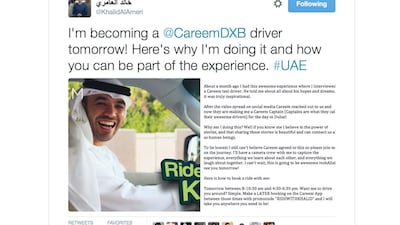Just over a year ago I conducted a social experiment as a taxi driver behind the wheel of a Careem taxi. Careem is a Dubai-based transportation company, founded in 2012, that allows customers to request a taxi via a smartphone app either immediately or for a later time.
In a country where it is a battle to stand on the street under the summer sun for half an hour waiting for a taxi, this technology and service was greeted with a very warm welcome from citizens and residents alike.
Fast forward four years and Careem is now operating in 10 countries and 25 cities across the Middle East and South Asia – a big statement about demand for the service, but a bigger statement about how the sharing economy is transforming lives and communities.
The “sharing economy” in its simplest sense is a peer-to-peer activity to access goods and services in a market. For example, by having a car I can now access technology that allows me to become a taxi driver and offer my services to another member of the community, essentially removing the middle-man in the form of a large taxi company with hundreds of drivers.
Global companies such as Airbnb (peer-to-peer renting of rooms or homes), Uber (peer-to-peer taxi service), and Lyft (peer-to-peer taxi service) have been pioneers in the space.
My experience as a Careem driver, or captain as they are called, was a lot of fun, but at the end of the day it was a social experiment. Throughout the day it opened my mind to the possibilities this style of business could have for myself and my fellow Emiratis.
What makes the experience of driving a taxi for the likes of Careem or Uber different than driving a regular taxi is that the cars are not marked as taxis, there is no specific uniform, and you can turn the app on or off whenever you want. In a sense, if someone drove by you as you were taking a passenger to their destination nobody would be able to tell if you were a taxi driver with passengers or just a group of people driving to a restaurant for dinner.
The discreetness of the work I feel is a plus in a society that is still somewhat judgemental to certain types of jobs and work, a taxi driver being one of them unfortunately – with engineers, financiers and doctors still held in high regard. But a process that allows people to drive their own cars, wear their own clothes, and offer transportation services to others I feel is a great selling point.
Imagine an Emirati student at university. It’s early evening on a Monday and she or he has finished their assignment and they have a few hours to spare before they meet up with friends for dinner. Instead of just sitting around scrolling through Instagram they can turn on an app, become a driver and make a few hundred dirhams for the day. Money aside they can gain work experience and focus on building skills in areas such as consumer technology, customer service and time management.
I am of the understanding that regulation is not in place to support Emiratis undertaking independent work in a sharing economy with apps such as Uber or Careem.
This is unfortunate, and I really think that government entities and regulators owe it to us to put such regulations in place and promote Emiratis entering this growing and innovative workspace. It gives Emirati youth the opportunity to gain financial independence on their own terms – an experience that sets them up for the future.
With a constant push to diversify Emirati employment beyond the Government sector and difficulties promoting the private sector as an attractive area of employment, the sharing economy might be the answer we have all been waiting for, as it will ignite an independent and entrepreneurial spark in our youth that wouldn’t have existed otherwise.
Khalid Al Ameri is an Emirati columnist and social commentator. He lives in Abu Dhabi with his wife and two sons.

